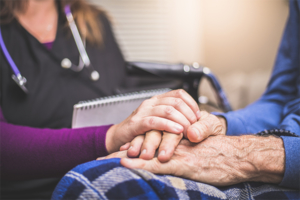Caring for Seniors: Is It Just the Blues or Something More?

Laguna Woods home care experts explore how to know when senior sadness is actually mental illness.
Sleeping problems, not enough appetite, and fatigue are common concerns in one’s older years. And frequently, they’re written off as just that. Yet for nearly 8 million seniors over age 65, these signs and symptoms are indicative of something more than normal aging – they’re signs and symptoms of mental illness. And just a small percentage are finding the available treatment that could considerably enhance their overall wellbeing.
Mental illness can be missed in older adults for many different reasons. For many, there’s a stigma that comes with admitting to and seeking help for mental and emotional concerns. For others, the assumption is that the common signs and symptoms of mental illness and aging go hand in hand and really should simply be accepted. And in some cases, mental illness indicators mirror medication side effects.
If you’re caring for seniors who may have mental illness, it’s important to find health care when you notice any of the following types of behaviors and possibly consider senior caring services to assist:
- Anxiety
- Personality or mood changes
- Changes in interest in formerly enjoyed activities
- Sleeping far too much or too little
- Changes in eating patterns
- Difficulty with concentration and memory
- Depression
Sadly, as little as 7% of older adults age 65 and over who very likely have some form of mental illness are actually receiving treatment, based on a report by the American Journal of Geriatric Psychiatry.
Dr. Susan W. Lehmann, clinical director of the division of geriatric psychiatry and neuropsychiatry and director of the Geriatric Psychiatry Day Hospital at the Johns Hopkins University School of Medicine clarifies, “Indeed, compared with younger adults and middle-aged adults, adults over age 65 were much less likely to be asked by their primary care physician if they felt tense or anxious and were much less likely to be referred by their primary care physician for mental health specialty care.”
Fortunately, you will find effective treatment plans for mental illness in older seniors. Step one would be to talk with the senior’s primary care doctor, who can recommend the most effective medication and/or therapeutic options to consider. CareWorks Health Services’ Laguna Woods elder care experts will help by escorting the senior to medical appointments and counseling visits, picking up prescription medications and providing reminders, and serving as a caring companion to share in conversations and to pick up on any changes that could indicate the need for further assistance and other senior care services. Contact us online or call us at (949) 859-4700 to find out more about our Laguna Woods elder care and caregiving services in the nearby areas.
